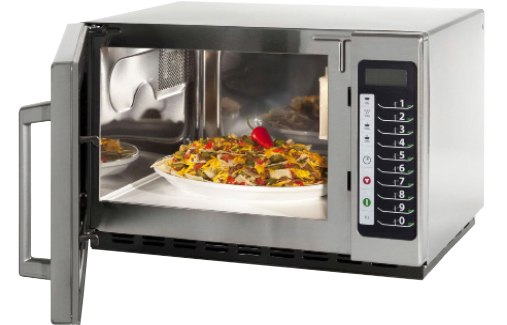The microwave oven has, in a very short time, become a standard piece of equipment in the kitchen. Its place is deserved: it is an extremely fast, convenient, clean and inexpensive way to cook.
However, because microwave ovens work in a completely different way from conventional ovens, new techniques have to be employed when cooking with them.
When a microwave oven is acquired, the first thing to do is familiarise yourself with all the new techniques. It is not difficult, but you have to think about what you are cooking in a slightly different way. Try to attend an introductory class in microwave cookery and begin by cooking basic dishes until you gain confidence.
How the food cooks
In microwave cooking, a power level has to be set on the oven, instead of a temperature. Timing is extremely important, too, for the length of time a dish will take to cook will depend on the amount, shape, density and moisture content of the ingredients.
Microwaves absorb food and penetrate about five centimetres deep. The microwave energy works on the molecules in the food – especially water, fat and sugar. This produces the heat that cooks the food.
Metals used in microwave
The microwave repels any kind of metal. It can be quite a violent event, if the power levels are high. Clearly, food in a metal container would not receive any energy, and so apart from the dangers mentioned, the food would just not heat well. This comment also applies to materials that contain traces of metal, such as some glasses and porcelains, and in particular items that have an obvious metallic trim or decoration. The only metal that can be used in the microwave is aluminium foil.
Cooking methods
Microwave cooking involves slightly different techniques of cooking than conventional cooking. These include arrangement of food, turning, stirring, rotating and standing time.
Arrangement: Careful organisation of food in the cooking utensil enhances the cooking and speeds up melting of food as energy spreads evenly across the food.
In some cases, you may feel the need to move the food on the outer side to the centre and vice-versa. This not only ensures mixing of all spices but also eliminates any possibility of over-cooking and under-cooking.
Foods that require turning over: Foods such as large roast, whole poultry, a ham or hamburger needs occasional turning to prevent over-cooking on one side.
Stirring: Since the outside of a utensil heats faster than the inside, stir food from outside to inside. Microwave cooking requires far less stirring as compared to conventional cooking.
Rotating: Foods that cannot be stirred or rotated, such as pies or cakes, need to be rotated or repositioned to ensure even cooking on all sides. Most foods do not need to be rotated.
Covering: Depending of the food type, different covering materials like polished paper can be used to retain heat and moisture, casserole tops, glass covers or plastic reps are used to trap steam and prevent dehydration. This increases cooking speed and helps retain natural moisture. Beware of steam burns, as you remove the covering and make sure to keep it away from your face.
Shielding: Aluminium wrappers can be used for thin bony areas, such as the wing tip of poultry, the head of fish tail, or the breastbone of a turkey, as they cook faster than the thicker areas. Use shielding when recommended in the recipe and do not let it touch the oven walls.
Piercing: Foods that lose moisture while cooking need to be pierced to break the skin or membrane, such as mince pie and other pastries or snack in this category. This prevents bursting and allows the steam to escape.
Standing time: It is one of the most important elements in microwave cooking. It takes some time before you are comfortable with right time-durations for different recipes. It may happen that you over-cook or under-cook in the beginning, but gradually you will get an idea about the perfect timings for different foods.












